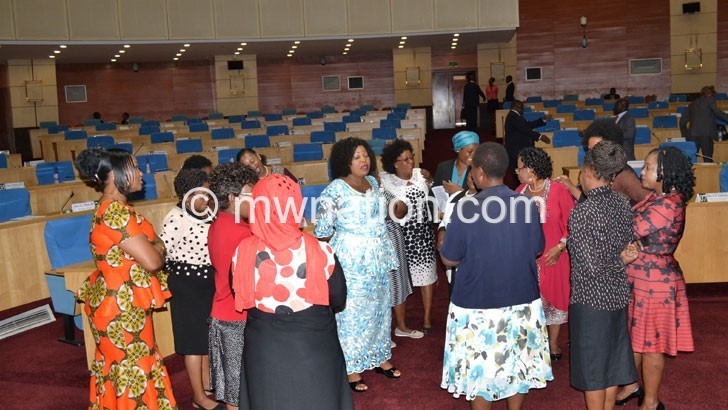Parties caution on 50:50 campaign
Political parties and elections stakeholders have spotted grey areas in efforts to increase women’s representation in political leadership positions, casting doubt on the success of the 50:50 campaign if challenges surrounding it are not immediately tackled.
But 50:50 Campaign Management Agency communication expert Wisdom Chimgwede expressed optimism that more women will compete and win the 2019 Tripartite Elections, saying over 700 women have expressed interest to contest in various positions.

In an interview on Thursday, Malawi Electoral Support Network (Mesn) chairperson Steve Duwa cited lack of funding as one of the reasons pushing women away from politics.
Said Duwa: “As a country, we had proposed reforms to create specific constituencies for women. The proposals were rejected and we missed an opportunity to promote women to participate at that level. Now we are preaching what we cannot fulfill.”
He also said some non-governmental organisations (NGOs) entrusted to carry out activities aimed at achieving the 50:50 representation of women in political positions have not yet received funding to that effect.
But according to Chimgwede, the organisation has given grants to 22 organisations to take the campaign to the grassroots.
On his part, United Democratic Front (UDF) secretary general Kandi Padambo said it is high time Malawi moved from First Past the Post system of electing leaders to the proportional representation to win the 50:50 campaign.
He said: “With proportional representation, people will be voting for political parties not individuals meaning that candidates would be anticipated to win elections despite the candidates being male or female.”
On the party’s effort to promote women in politics, Padambo said UDF has political structures specifically for women.
“We have two women as regional vice-presidents of the party and many others in high positions. We have an autonomous wing for women and they have a voice in the national executive council,” he said.
Democratic Progressive Party (DPP) spokesperson Nicholas Dausi, in a separate interview, said the party is doing enough to promote women being the only party with a female as secretary general.
However, he was of the view that women need not to be favoured but encouraged as they are capable.
On the other hand, Malawi Congress Party (MCP) publicity secretary Reverend Maurice Munthali said the party slashed nomination fees for female aspirants in its primary elections from K50 000 to K30 000 to encouragemore women to compete in next years’ polls.
He said: “The MCP manifesto highlights that women are a driving force in every economy. They need to find their rightful places in key position because we know they are capable.”
A recent report by the Pan-African and Civic Educators Network (Pacenet) and Youth and Society (YAS) named Mulanje West parliamentarian Patricia Kaliati as the best when it comes to good management of Local Development Fund (LDF) as well as constituency development fund (CDF).
Other reports have also found women to be more financially disciplined and less corrupt than men.
In July this year, the Malawi Electoral Commission (MEC) reduced by 50 percent nomination fees for female aspirants to K20 000 for candidates in the position of local government councilor against K40 000 for their male counterparts while parliamentary candidates will pay K250 000 against K500 000 for their male counterparts.
In the 2014 election, all aspirants for the parliamentary seat paid a nomination fee of K200 000.





